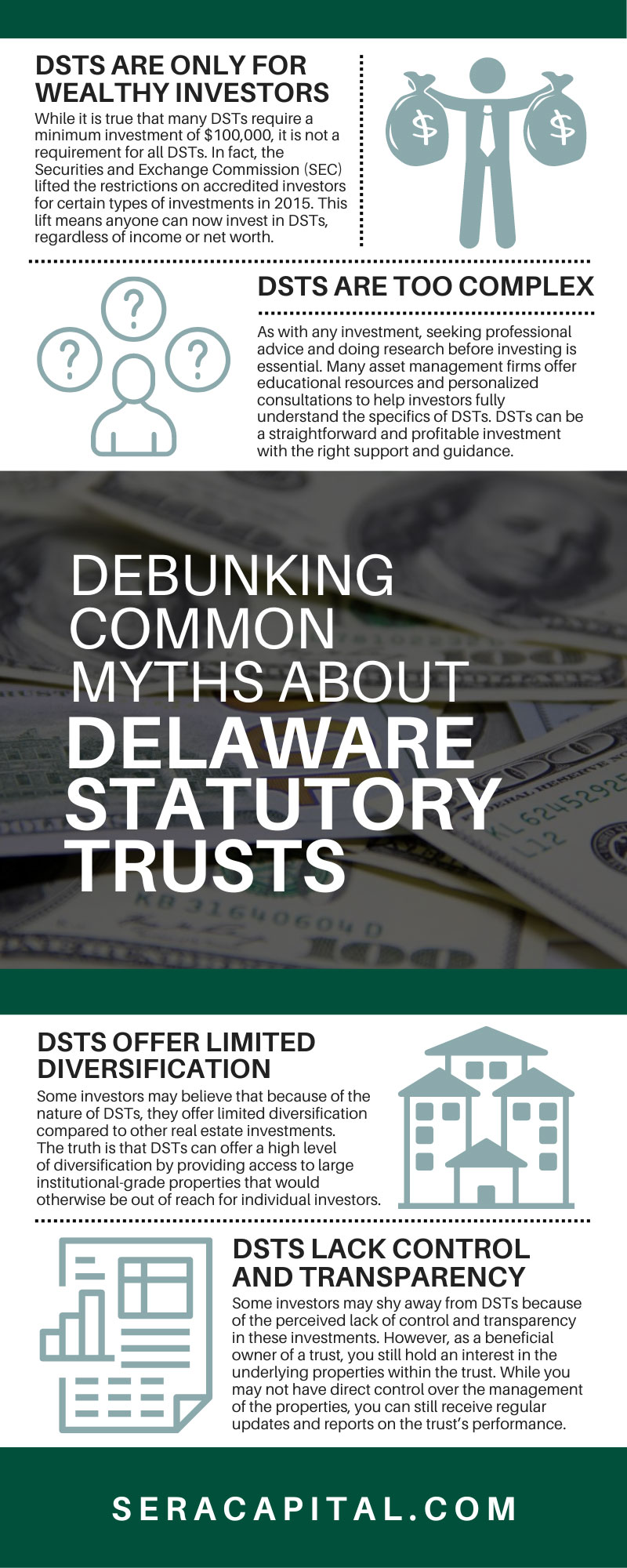Debunking Common Myths About Delaware Statutory Trusts

Carl E. Sera, CMT
December 15, 2023
Delaware Statutory Trusts (DSTs) have been gaining popularity in recent years as a way for investors to hold fractional interests in large, institutional-grade properties. However, many misconceptions surrounding DSTs prevent potential investors from fully understanding their benefits and risks. In this blog, we will debunk some of the common myths about Delaware Statutory Trusts and provide you with a clearer understanding of this investment vehicle.
A Closer Look
To dig deeper, let’s first understand what a DST is. A Delaware Statutory Trust is a legal trust that offers real estate investors an opportunity to invest in a trust’s beneficial interest. This trust, in turn, holds title to various types of real estate assets. Despite the potential advantages, misconceptions about DSTs abound, giving rise to uncertainty and skepticism among potential investors. These myths often stem from a lack of understanding or misinformation. By debunking these myths, we aim to equip you with factual information and insights to aid your investment journey. Rest assured, we’ll shed light on the realities of DSTs, separating the wheat from the chaff, as it were. Let’s delve into some of these common myths and uncover the truth.
Myth #1: DSTs Are Only for Wealthy Investors
One of the most common misconceptions about DSTs is that they are only available to high-net-worth individuals or accredited investors. This myth is not true. While it is true that many DSTs require a minimum investment of $100,000, it is not a requirement for all DSTs. In fact, the Securities and Exchange Commission (SEC) lifted the restrictions on accredited investors for certain types of investments in 2015. This lift means anyone can now invest in DSTs, regardless of income or net worth.
Myth #2: DSTs Are Too Complex
Another myth surrounding DSTs is that they are too complicated for the average investor to understand. While DSTs do have a unique structure and require thorough due diligence, it does not mean they are overly complex or beyond your understanding. In fact, many investors find that investing in a DST is simpler than owning and managing a property directly.
Furthermore, as with any investment, seeking professional advice and doing research before investing is essential. Many asset management firms offer educational resources and personalized consultations to help investors fully understand the specifics of DSTs. DSTs can be a straightforward and profitable investment with the right support and guidance.
Myth #3: DSTs Offer Limited Diversification
Some investors may believe that because of the nature of DSTs, they offer limited diversification compared to other real estate investments. The truth is that DSTs can offer a high level of diversification by providing access to large institutional-grade properties that would otherwise be out of reach for individual investors.
In addition, DSTs can also hold multiple properties within the trust, allowing investors to spread their investment across different assets and locations. This diversification can help mitigate potential risk and provide consistent cash flow.
Myth #4: DSTs Lack Control and Transparency
Some investors may shy away from DSTs because of the perceived lack of control and transparency in these investments. However, as a beneficial owner of a trust, you still hold an interest in the underlying properties within the trust. While you may not have direct control over the management of the properties, you can still receive regular updates and reports on the trust’s performance.
There are strict SEC regulations in place to ensure that DSTs that provide transparency and protection for investors. To fully understand your rights and responsibilities as an investor, it is vital to thoroughly review all documentation and disclosures before investing in a DST.
Myth #5: DSTs Offer Limited Income Potential
Many investors may believe that DSTs offer limited income potential compared to other real estate investments. However, this is not necessarily true. While DSTs may offer a lower return on investment compared to direct property ownership, they can provide a consistent and predictable stream of passive income.
They also often have lower expenses and fees associated with them, which can increase the overall return for investors. It is essential to consider your individual investment goals and risk tolerance when evaluating the income potential of a DST.
Myth #6: DSTs Are Risky Investments
Perhaps one of the most concerning myths surrounding DSTs is that they are inherently risky investments. While all investments carry some level of risk, DSTs may offer a lower risk level than other real estate investments.
Since investors often use DSTs in large, stabilized properties, they can provide more stability and potential for consistent cash flow. Furthermore, DSTs allow investors to diversify their investments across multiple properties. This diversification allows investors to mitigate potential risks further.
Myth #7: DSTs Are Difficult To Sell
A common misconception about DSTs is that they are difficult to sell. This myth stems from the fact that DSTs, like many real estate investments, do not have a secondary market. While it is true that DSTs are not as easily traded as stocks, it does not mean they are impossible to sell. The reality is that DSTs can be sold, but the process may take longer compared to selling stocks or mutual funds. Moreover, there are ways to strategically plan for liquidity events, such as through a property’s sale, refinancing, or via a 1031 exchange. As always, it’s important to understand the terms of your investment, including exit strategies, before investing in a DST.
Closing Debunking Thoughts
In conclusion, Delaware Statutory Trusts have many benefits, making them an attractive investment vehicle for real estate investors. However, like any investment, there are risks and misconceptions to be aware of before investing. By debunking these common myths, we hope to provide you with a clearer understanding of DSTs and empower you to make informed investment decisions.
We encourage you to do your own research and seek professional advice from reputable asset management firms before investing in DSTs. Find a respected 1031 exchange advisor to help you with the investment process. With the right knowledge and guidance, DSTs can be valuable to your investment portfolio. Don’t let these myths hold you back from exploring this potential opportunity for passive income and portfolio diversification. Dispel those misconceptions and consider adding DSTs to your investment strategy today!

Categories
Strategize Your Success
